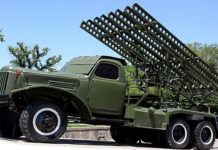Russian President Vladimir Putin has said Russia is prepared to refrain from deploying in its European part the 9M729 missiles, which Washington regards as a violation of the Intermediate Nuclear Forces Treaty, but on the condition of reciprocal steps by the NATO countries, TASS reported. In that connection, Putin suggested considering different verification measures, including those regarding the Aegis Ashore systems at US and NATO bases in Europe and Russia’s facilities in the Kaliningrad Region.
Putin said that Russia remained committed to the moratorium on the deployment of the ground-launched intermediate and shorter range missiles and described as still relevant the invitation addressed to NATO for declaring a similar reciprocal moratorium. Also, he urged all parties concerned to explore ways of maintaining stability in the Asia-Pacific Region “in a world without the INF treaty.”
The full text of Putin’s statement is found below.
“The Russian Federation remains of the opinion that the Intermediate Nuclear Forces Treaty is a crucial element of the architecture of maintaining international security and strategic stability. The treaty played a special role in terms of maintaining the predictability and restraint in the missile sphere in the European space.
We believe that the United States’ pullout from the INF Treaty, which resulted in its termination, was a serious mistake that exacerbated the risks of a missile weapons race, growth of the confrontation potential and slide into uncontrolled escalation. In view of the lingering Russia-NATO tensions, the new threats to pan-European security are obvious.
In a situation like this, vigorous efforts are needed to ease the shortage of trust, to strengthen regional and global stability, and to reduce the risks stemming from misunderstandings and disagreements in the field of missile weapons.
In this context, we reaffirm the commitment to the Russian Federation’s previously announced moratorium on the deployment of ground-launched intermediate-and shorter-range missiles as long as no similar class missile weapons of US manufacture emerge in the respective regions.
We also believe that our call addressed to the NATO countries for considering the possibility of declaring a reciprocal moratorium remains relevant.
In order to promote the search for compromise political and diplomatic solutions we are prepared for further steps geared to minimizing the negative effects following the collapse of the INF Treaty on the basis of principles of equal and indivisible security and respect for the balance of interests.
Proceeding from our earlier proposal for devising instruments of control to back up the Russian initiative for reciprocal moratoriums we invite all parties concerned to consider options of mutual verification measures for lifting of the existing concern.
“In particular, it might be possible to consider verification measures regarding the Aegis Ashore systems equipped with Mk 41 launchers at US and NATO bases in Europe and the 9M729 missiles at Russian military facilities in the Kaliningrad Region. The purpose of such verification measures would be to confirm the absence from the facilities, encompassed by the agreements, of ground-launched intermediate and shorter range missiles as well as weapons whose parameters and classification have remained a controversy between the two parties (Russia’s missile 9M729).
While staying committed to the consistent position the 9M729 missile is in full conformity with the terminated INF Treaty, Russia nevertheless is prepared to act in the spirit of good will and to refrain from deploying the 9M729 missiles in its European territory further on, but on the condition of reciprocal steps by the NATO countries, which will rule out the deployment in Europe of weapons that were outlawed under the INF Treaty.
We are calling upon all parties concerned to explore ways of maintaining stability and preventing missile crises “in a world without the INF Treaty” regarding the Asia-Pacific Region. We are open to joint work along these lines.”












